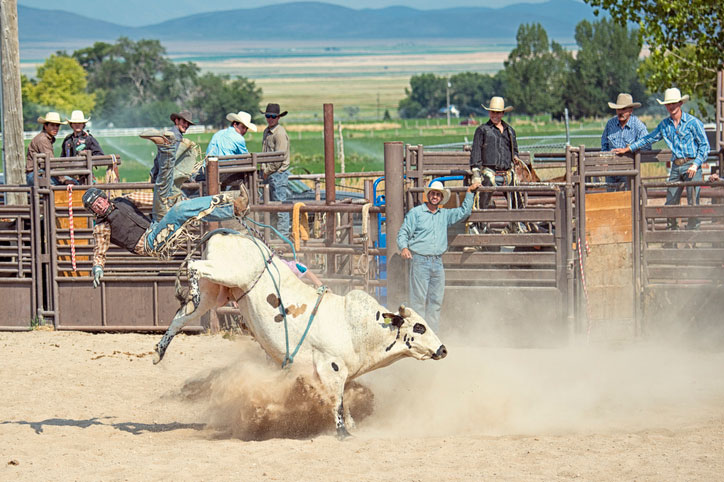Leadership: 7 Unintentional Lessons I Learned from Failure
2/4/2019

Failure is often misinterpreted.
We shy away from failure, especially if we are perfectionists. When in reality, it can be the greatest learning experience and an opportunity for personal growth.
Recently I applied for a superintendent position in my school district. The district is the second largest in Montana with roughly 10,500 students in 22 different schools ranging from preschool to high school.
Going into the application process, I understood I was the underdog and the least experienced candidate. I have been in education for a mere 20 years, with eleven of those years being a principal of either an elementary, middle school, or high school. I do not have superintendent experience, but I have been a part of a multitude of leadership opportunities, both elected and earned. Does successful leadership come from years of educational experience?
At 27, I signed my first contract as a principal. At 37, I was elected President of the Elementary and Middle School Principal's Association for Montana, and at 41 I was elected the President of the School Administrators of Montana. Does successful leadership come from positions held?
I have been lucky enough to win some awards in my journey: Presidential Award for Excellence in Teaching Math and Science, National Blue Ribbon Award for my school, and most recently the National Distinguished Principal Award. Does successful leadership come from winning awards?
Understand though, that I have had many job interviews in which I was not successful. In fact, I had applied and interviewed for seven different principal positions before I was finally hired in my current position. I also understood that getting the superintendent position would be amazing. I know I could do this job with grace, perseverance, and hard work. Does successful leadership come from failed interviews?
Someday, I hope to apply again. Through this process I came away with seven unintentional lessons that I have learned from this failure…though I have chosen to reframe it. I believe all successful leaders learn from failure.

1 - Flip Your Perspective
Failure comes in a variety of packages that people internalize, and many use as it as an excuse to not bounce back. When someone fails, I wonder what goes through their mind. This is a topic that's been explored quite a bit lately. You will see a plethora of articles and research on failure. Most of these articles state that when successful leaders are interviewed, a majority of them say it was the failures they learned from that made them better. In order to do this, we must "flip our perspective."
We could live and wallow in anger and sadness knowing that we failed at something. Instead the more mentally healthy a person is, the faster they can reflect and decide how to succeed the next time.
Harnessing electricity and developing the light bulb are two of the most famous inventions of all time. It was not done overnight. Ben Franklin could have stopped after each failed attempt, and said I am done. Instead, Ben Franklin continued to learn from his failure by flipping his perspective. He used a mantra in his mind that could have sounded something link this, "I almost got it. What if I experimented with this filament or used this material…?" He kept going by changing his thinking…Ben had grit!
In much the same manner, when I was called by the school board late on a Tuesday night while I was enjoying a sausage and mushroom pizza at a local establishment, I was truly shocked. I first thought, "I failed." I spent roughly five minutes in this state of amazement, then started reflecting on what I am going to do next time. I flipped my perspective immediately to consider how failure can be a powerful learning experience.

2 - Win - Win Mindset
In every failure, there is a win. This win may be hard to see at the moment of failure. How can we adopt an attitude that allows us to see the positive in every failure and find the win from within?
Many people that have gone on to be leaders in their fields have done so only after experiencing failure first: in an election, in failing to garner a higher position, or even in failing to make a basketball team. From this failure, they were actually set up for bigger accomplishments…creating a "win-win" scenario.
Let's use the basketball "GOAT," or greatest of all time, Michael Jordan. In high school, Michael Jordan was cut from his varsity basketball team as a sophomore, locked himself in his room and cried for days. Michael continued to work out and he actually grew four inches in height by the next year's tryouts. He made the team his junior year and had a monumental senior season leading to a scholarship at the University of North Carolina. As you may know, he has six NBA championships with a multitude of MVP, scoring titles, defensive awards, and even gold medals in the Olympics. Michael's win-win moment was when he changed his mindset, and set new goals for the following year. His failure turned into a win.
Similarly, but not nearly with the same athletic prowess, my pursuit of the superintendent position was a win-win. If I would have been hired as the next superintendent that would have been a win for me and the district. In addition, when I failed to get the position I also won. I won knowing what I need to do in order to get the position next time. I understand more about myself, what areas I need to improve, and what I need to do to exude and communicate my beliefs in a future interview!

3 - Teach Others, Like Students that Failure is Acceptable
I am so lucky to have a great group of people I get to be around every day, from colleagues and staff, to community members and friends. When I didn't get the job, I heard from so many positive people. It usually started out something like this, "I am sorry you didn't get the position." My typical response was usually, "I am good with it. I learned a lot." Then sometimes I would go into detail on everything I learned from the experience.
The day following the school board's call of "no," I was walking down the hallway of my school and a group of staff members surrounded me and gave me a hug. I almost lost it. From there I went outside on the playground to supervise morning entry. A group of fourth grade girls surrounded me and told me, "We are sorry you didn't get the job. But, we are happy you get to stay with us." That is when I lost it. I began to cry and thanked them as I continued to walk from the upper playground to the lower playground.
I knew my conversations with kids this day, and the proceeding days were going to be important. At lunch, several students were ecstatic that I didn't get the job. I understood what they were saying and this was a huge compliment.
I used words with the kids about remaining positive and having a growth mindset. I told them how much I learned from the experience about myself, and my community. They saw me be strong, yet also cry and stay positive. I am not the crying type, but it can be part of failure and it is okay for students, friends, and the public to see it. It is a human emotion that we should not assign to weakness. Therefore, I continued to tell them what you do after you fail is more important than what you did previous to the failure itself.

4 - Learning About Yourself
Reflection about the words we use, the actions we take, and how we chose to spend our time tells us a lot about who we are. The moments after failure are very interesting to me. You can learn a lot about a person and how they handle their emotions. Do they rage? Are they shocked? Are they providing excuses immediately? Are they calm? Are they thinking about how much of a failure they are in these moments?
Much like a death, there are a series of emotions that a person may go through after failure. Shock, sadness, anger, and finally acceptance are a part of many popular grief cycles. Failure can mirror many of these emotions, obviously different than losing a loved one.
My 1985 Chicago Bears were elated after beating the New England Patriots 44-16. How did the Patriots handle this loss? Did they end up not being in any more championship games since 1985? Only time will tell…! Likewise, my 2018 Chicago Bears were elated to move into the playoffs. It was down to a field goal by kicker, Cody Parkey, to secure the game. Unfortunately, Cody hit the upright…and the cross bar…thus missing the field goal to win it. Many Chicago fans didn't handle this failure very well, but true Chicago fans know that we will be better next year as we have learned a lot about ourselves.
Similarly, I learned a lot about myself with the failure of not getting the superintendent position. Most importantly, I learned that I have a lot more to learn. Being humble and remaining humble is important when surviving failure. There are always other people that are smarter than me and that could replace me in my own position. One of my take-a-ways through self-reflection is to more effectively communicate and emanate my confidence that I can do this job, and do it successfully!
What was difficult as I went through this process was quickly changing my train of thought. I had to start making decisions and having conversations as if I was in the position already. I learned that listening is even more important at this level than at any other position I had obtained. As many people interviewed me, I listened to the types of questions they were asking. I understand the questions tell a story, a story of what each group's values are. The pattern of questions was different for each round of the interview processes: teachers union, leadership team, cabinet, community leaders, and the school board. Each set of questions connected their values to the position of superintendent. I decided prior to the interviews what qualities and values that make me who I am, and to make sure that is resonated throughout each set of responses. I know I can get better at this! Again, I have learned so much about myself!

5 - Setting Yourself Up for the Future
Failure, done right, sets you up for a brighter future. If you keep a list, a list of people who have crossed you, you will forever live in retribution and resentment. It's best to drop this list and decide how this failure can be used to set yourself up for the future.
We can learn from our failure by finding things we can improve upon. Most of the time failure can be from lack of experience, as we know the more we do something the more we learn how to achieve and succeed. Shaquem Griffin was told he didn't have enough talent to be recruited for football at the University of Florida, Florida State University, or the University of Miami. These top three universities all passed on Shaquem his senior year in high school. Central Florida University took a chance on him and they were not let down. In fact, over Shaquem's career as linebacker, CFU went from 0-12 in 2015, to them going undefeated 13-0 in 2017. Shaquem was the first one-handed college player recruited as the 141stpick by the Seattle Seahawks as linebacker.
As for myself, I believe the failed interview has set me up for future positions. I understand more fully what I need to do in order to make it at the next level, as well as what I need to do to get more experience for future success.

6 - Not Shying Away from Hard Conversations
When someone fails at something, we sometimes don't know what to say. I find it similar, again, to trying to find the right words to say to someone who has lost a loved one. Just being there and letting the person know you are there for them goes a long when failure occurs. I found that many times people will even walk the other way when they see me. Most often they would steer the conversation away from dealing with the failure. We must not shy away from these hard conversations.
In a failed relationship, friends many times have to decide how they are going to talk with you about the failure. Some will comfort, some will give advice, while others will not even engage. Some even decide to not be around you after the failure. It is interesting to me that they are there for you for all your successes leading up to the failure, but are absent afterwards when failure occurs. You will find true friends that stay with you along the process no matter what the outcome.
We must not shy away from having these hard conversations with kids. We let them know it is okay to fail, and that we are judged more by how we get back up again. We must model this as well as we use descriptive language to teach our kids. Most importantly, we must remain positive in spite of the negative obstacles that transpire. We must show them that when we fail at something, we do not stop, and we never give up!

7 - Pay It Forward by Using Grace, Compassion, and Encouragement for Others
So much of what we talk about is how we handle failure in ourselves. We must step outside of our own shoes and show grace, compassion, and encouragement for those that fail around us. As we try not to judge others, we must acknowledge that when they fail, it is okay! We can show kindness and start a conversation. Too many times in society we put a negative connotation on failure. We see it as a weakness. It may be our fascination with sports and competition, but we must help change that mindset in our society.
When a close friend didn't receive an award recently, I had that hard conversation. We talked about the accomplishments they have done so far (past), all the things they have going on currently (present), and the things that are upcoming for this person (future). Lastly, I acknowledged how much I believe in them! Then, I bought the person a beverage!
We need to reach out to people whether they are successful or if they fail. We need to be compassionate and let people know we care about them no matter what. We then encourage them on to greater endeavors!
- Learning How to Say No and Set Boundaries with Parents - November 21, 2022
- If You Had Only One Behavior Strategy to Use in Your Classroom, What Would It Be? - September 26, 2022
- Live Your Code: 7 Strategies That Will Help You Be the Most Effective Educator You Can Be - August 15, 2022









